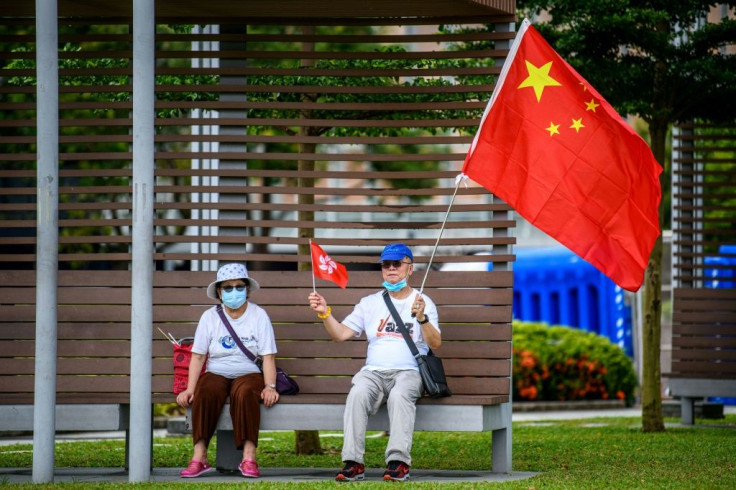Hong Kong National Security Law: Protester Carrying Independence Flag Becomes First Person To Be Arrested
KEY POINTS
- Protester carrying pro-independence flag became the first person to be arrested under new national security law
- The new law took effect at 11 p.m. Tuesday, an hour before the anniversary of the city's handover from the U.K to China
- The law outlines four types of security crimes: subversion, secession, terrorism and colluding with foreign forces
A man carrying a flag calling for Hong Kong's independence became the first person to be arrested under the new national security law imposed by China on the city. The arrest took place at a protest march in the city’s Causeway Bay shopping district Wednesday (July 1).
“A man was arrested for holding a Hong Kong independence flag in Causeway Bay, Hong Kong, violating the National Security Law. This is the first arrest made since the law has come into force,” the Hong Kong Police Force tweeted.
The Associated Press reported that the police issued multiple warnings to the protesters that they might be violating the law. However, when they did not pay heed to officials, the police took one of the protesters into custody.
#BREAKING: A man was arrested for holding a #HKIndependence flag in #CausewayBay, Hong Kong, violating the #NationalSecurityLaw. This is the first arrest made since the law has come into force. pic.twitter.com/C0ezm3SGDm
— Hong Kong Police Force (@hkpoliceforce) July 1, 2020
The new law took effect at 11 p.m. Tuesday, an hour before the anniversary of the city's handover from the United Kingdom to China. The new law, which makes it easier to punish the protestors, outlaws four types of national security crimes:
- Subversion – “To participate, plan or implement… acts of secession… whether or not force or the threat of force is used.”
- Secession – “To participate, plan or implement… acts of subversion of the state, whether by force or other unlawful means.”
- Terrorism- “To participate, plan, implement or participate in implementing acts that cause or intend to cause serious societal harm – with the aim of threatening the Chinese or Hong Kong governments, an international organization or the public.”
- Colluding with foreign forces- “To steal, spy, bribe or unlawfully provide state secrets or intelligence related to national security on behalf of foreign institutions, organizations or agents.”
The new law also mentions three scenarios when China might take over a prosecution:
- Complicated foreign interference cases
- "Very serious" cases
- When national security faces "serious and realistic threats.”
"Both the national security agency and Hong Kong can request to pass the case to mainland China and the prosecution will be done by the Supreme People's Procuratorate and the trial will be in the Supreme Court. No matter whether violence has been used, or the threat of violence used, leaders or serious offenders will be sentenced for life imprisonment or a minimum of 10 years in jail. The Hong Kong government has no jurisdiction over the national security agency in Hong Kong and its staff when they are discharging duties provided in this law,” the law states.
Despite the law prompting concerns that the judicial independence of the autonomous region will be eroded, Carrie Lam, the chief executive of Hong Kong, defended the law saying, “The legislation aims to prevent, curb and punish acts of cessation, subversion of state power, terrorist activities ..."
"These crimes will be clearly defined in the law. We will only target an extremely small minority of people who have (broken) the law. The life and property, basic rights and freedoms of the overwhelming majority of Hong Kong residents will be protected."

© Copyright IBTimes 2024. All rights reserved.





















